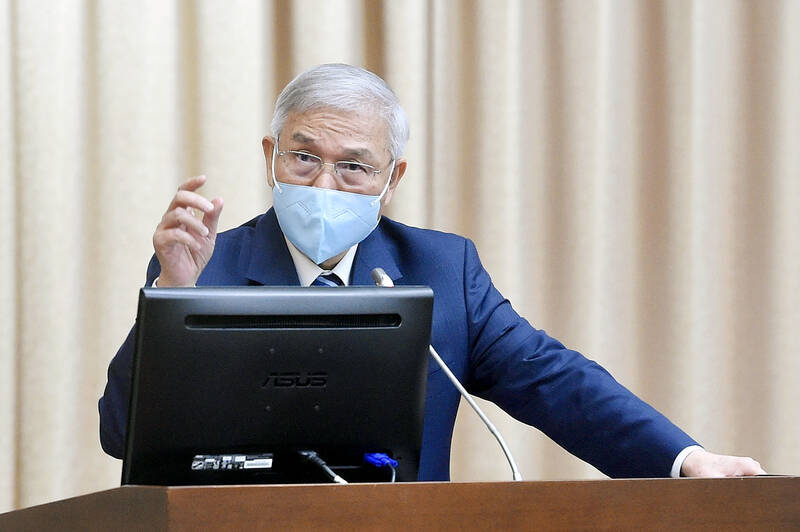Taiwan’s inflation remains controllable and would decline to the central bank’s target territory next year, central bank Governor Yang Chin-long (楊金龍) said yesterday.
Global supply chain disruptions, energy and raw material prices hikes, and the local currency’s depreciation have played a part in inflation’s rise in Taiwan, Yang said during a speech at Academia Sinica in Taipei’s Nangang District (南港).
The central bank has set an inflation target of 2 percent to keep consumer prices low and stable.

Photo: CNA
The bank in September forecast that the consumer price index (CPI) would grow 1.88 percent next year, slightly higher than the 1.86 percent the Directorate-General of Budget, Accounting and Statistics projected yesterday afternoon.
Inflation has hovered around 3 percent in the past few months.
Yang said global supply chain snarls during the COVID-19 pandemic pushed up energy and raw material prices, and the situation deteriorated earlier this year after Russia’s invasion of Ukraine.
Taiwan, which relies heavily on imported energy and raw materials, is susceptible to price movements, he said.
Imported inflation became more evident amid the depreciation of the local currency, Yang said.
The average price of imported goods last month grew 11.17 percent in US dollar terms, but spiked 17.1 percent in New Taiwan dollar terms, because the local currency has fallen 5 percent against the greenback this year, he said.
The NT dollar is expected to fall 6 percent against the US dollar this year, which would contribute 0.15 to 0.3 percentage points to the CPI, which would be tolerable, Yang said.
Government agencies have assisted by cutting taxes on imported energy and raw materials, and had earlier frozen electricity prices, he said.
The central bank has predicted that GDP would grow 2.99 percent next year and is to update its forecast next month.
International research bodies have said the US and Europe might enter recession next year, facilitated by drastic monetary tightening.
Yang said he is not sure if stagflation would occur as it did during the oil crisis in the 1970s, but conceded that there are tough challenges ahead.
The US Federal Reserve has said that it would raise interest rates further to bring inflation down to 2 percent, from 7.7 percent, even at the cost of job losses and economic pain.
Such a drastic move is not necessary in Taiwan in light of controllable inflation, Yang said, adding that the central bank would make policy decisions based on the nation’s needs.
Yang in September said that the central bank could press ahead with, slow down or halt monetary tightening next month after factoring in the latest economic data.

KEEPING UP: The acquisition of a cleanroom in Taiwan would enable Micron to increase production in a market where demand continues to outpace supply, a Micron official said Micron Technology Inc has signed a letter of intent to buy a fabrication site in Taiwan from Powerchip Semiconductor Manufacturing Corp (力積電) for US$1.8 billion to expand its production of memory chips. Micron would take control of the P5 site in Miaoli County’s Tongluo Township (銅鑼) and plans to ramp up DRAM production in phases after the transaction closes in the second quarter, the company said in a statement on Saturday. The acquisition includes an existing 12 inch fab cleanroom of 27,871m2 and would further position Micron to address growing global demand for memory solutions, the company said. Micron expects the transaction to

Vincent Wei led fellow Singaporean farmers around an empty Malaysian plot, laying out plans for a greenhouse and rows of leafy vegetables. What he pitched was not just space for crops, but a lifeline for growers struggling to make ends meet in a city-state with high prices and little vacant land. The future agriculture hub is part of a joint special economic zone launched last year by the two neighbors, expected to cost US$123 million and produce 10,000 tonnes of fresh produce annually. It is attracting Singaporean farmers with promises of cheaper land, labor and energy just over the border.

US actor Matthew McConaughey has filed recordings of his image and voice with US patent authorities to protect them from unauthorized usage by artificial intelligence (AI) platforms, a representative said earlier this week. Several video clips and audio recordings were registered by the commercial arm of the Just Keep Livin’ Foundation, a non-profit created by the Oscar-winning actor and his wife, Camila, according to the US Patent and Trademark Office database. Many artists are increasingly concerned about the uncontrolled use of their image via generative AI since the rollout of ChatGPT and other AI-powered tools. Several US states have adopted

A proposed billionaires’ tax in California has ignited a political uproar in Silicon Valley, with tech titans threatening to leave the state while California Governor Gavin Newsom of the Democratic Party maneuvers to defeat a levy that he fears would lead to an exodus of wealth. A technology mecca, California has more billionaires than any other US state — a few hundred, by some estimates. About half its personal income tax revenue, a financial backbone in the nearly US$350 billion budget, comes from the top 1 percent of earners. A large healthcare union is attempting to place a proposal before